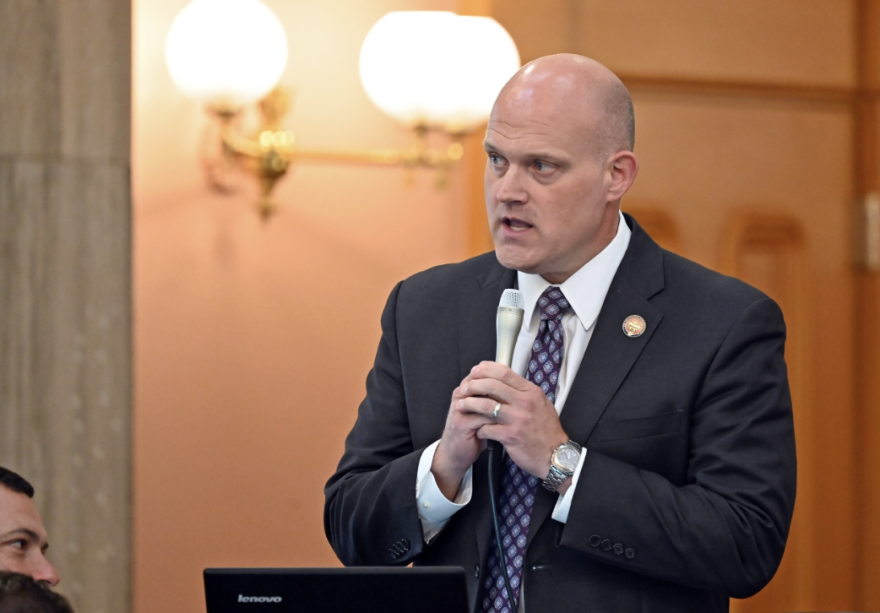Homeowners in many parts of the state are bracing themselves for high property tax bills after new valuations increased more than 30% in some cases.
There are more than a dozen property tax relief bills being considered by lawmakers. But it's unlikely they'll pass soon enough to help many homeowners with impending tax hikes.
Valuations are up
The value of homes in many parts of Ohio is increasing. And in some parts of the state, home values have increased by more than a third. That’s good for those selling homes.

But Rep. Scott Wiggam (R-Wayne County) said the other side of that - property taxes - are the number one issue he’s hearing about from his constituents. He said many property owners in his area are worried about massive increases and how they are going to pay their upcoming property tax bill.
“I’ve had people tell me they are going to have to think about whether they are going to have to sell their home and try to find something less expensive or rent in order to make ends meet. This should never happen,” Wiggam said.
Yet Wiggam said that's exactly what is happening in some cases.
Why the current system is not working
Former Ohio Tax Commissioner Tom Zaino testified before the Ohio Joint Committee on Property Tax Review and Reform, a legislative committee studying property taxes in Ohio, in February. He told the panel that House Bill 920, the system established more than four decades ago to keep those taxes from spiking, is broken.
“The school districts have done their own type of what I call tax planning by utilizing levies that have been enacted over the past 48 years but are exempt from House Bill 920," Zaino said.
Wiggam said the current valuations and the inability to control tax spikes caused by them will be a problem for property taxpayers in his area.
“Wayne County has ten school districts. Zero of the school districts had an actual levy on in 2023," Wiggam said. "Yet ten of those school districts will see an $11 million increase in actual tax receipts, even though they had no levy that was on the ballot."
Possible legislative solutions
Greg Lawson, research fellow for the conservative think tank the Buckeye Institute, agreed with Wiggam that the current tax system is broken. And despite more than a dozen bills at the Statehouse to help with that problem, Lawson said he doesn’t think meaningful change will happen soon.
“These are not easy issues. And the reasons that we have gotten to this point is because it is hard, it is complicated and not a lot of people understand the ins and outs of it and, in a sense, this is kind of a structure of government challenge," Lawson said. "This is about how we deliver services at the local level and how many layers of levies you have."

Hannah Halbert, executive director for liberal-leaning research group Policy Matters Ohio, agreed the current tax structure is complicated. But she said it's important to remember local taxes pay for more than schools; they also pay for police, fire, EMS, public parks, libraries and more. And she said any changes that are made need to make sure those are whole.
Halbert likes Senate Bill 271, a bipartisan bill that would essentially create a circuit breaker to protect some homeowners and even renters, who would see increases in what they pay due to increased taxes.
“So if you are a homeowner or renter and your tax cost is going over 5% of your income, you will get a rebate or a refund from the state to offset that increase," Halbert said. "And so you are both protecting homeowners and the homeowners who need this kind of support the most – the 60% of Ohioans who are just above middle class or below. And you are also making sure that schools, public safety, the folks on the ground who make your community livable get what they need.”
There are income limits and property tax value ceilings on that bill so it wouldn’t help everyone. And that legislation, which Halbert says is the only method she sees as working, has a long way to go - it has just been introduced in the Senate.

There’s also a resolution sponsored by Wiggam and fellow Republican Beth Lear (R-Galena) that would put before voters an amendment to limit spikes in property taxes by capping increases at 4%. But that would have to pass with supermajorities in the House and Senate by Aug. 7 to be on this November’s ballot.
The committee Zaino testified in front of earlier this year won’t likely come out with recommendations to get something in place by the end of this year either.
There was a provision in House Bill 57, introduced last year, to provide homestead tax provisions to more seniors living on fixed incomes. There are also bills to expand that, which Halbert said might help some.
“There’s lots of these kind of carve-out ideas floating around but nothing gets to the systemic issue of homeowners need to be able to have consistency and manage what their property taxes are going to look at. They shouldn’t have to have huge surprises," Halbert said.
Lawson agreed on that point. He said it’s going to come down to Ohioans putting pressure on their elected statewide leaders to take control to make meaningful changes.
“Ohioans are going to have to ask policy makers, 'what do we do to get what we want out of our local government and how do we get it done more efficiently so we can start to pare this back so we don’t have to keep adding levy after levy after levy?' Because that is ultimately the main driver of all of this," Lawson said.

But most political observers say property tax reform is not the main issue that’s likely to be the main driver of this fall’s elections. Ohio lawmakers go on a summer break at the end of this month and aren’t scheduled to be back in session until after the November election.
Among the bills under consideration now:
Homestead tax exemption bills One of the bills that would expand the Homestead tax exemption is HB 274, a Republican-sponsored bill that has gained Democratic support. Another piece of legislation, HB 57, has made more progress through the legislative process but has been stalled since last year.
Credits to certain property tax payers SB 271 is the bipartisan bill supported by Policy Matters Ohio that would give credits to low and lower middle income property taxpayers and renters.
Property tax freeze for seniors HB 263, another bipartisan bill, would freeze taxes for seniors who are 70 or older as long as their income does not exceed $70,000 and they have owned their home for ten or more years.
Eliminating replacement levies HB 344 is Republican-sponsored. No Democrats have signed onto it at this point. And only three Republicans, including the two co-sponsors, are pushing it. It would eliminate the authority to levy replacement property tax levies and modify the law governing certain property tax complaints.
Changing the taxing process HB 187 was originally backed by only Republicans when it passed the Ohio House. But it did get some bipartisan support in the Senate after members changed the House bill. It's now in limbo until the House goes along with the changes that were made. And there are questions about whether the changes made by the Senate would be possible under the current tax structure. The upshot of this bill is it would allow for the temporary use of three-year average in the Ohio Department of Taxation’s uses to review property values, rather than the typical one-year lookback.
Proposed constitutional amendment House Joint Resolution 6 would ask voters whether to "throttle" property tax increases to 4% per year. The provision only has Republican support at this point. And it's unlikely to be on the ballot this fall.



